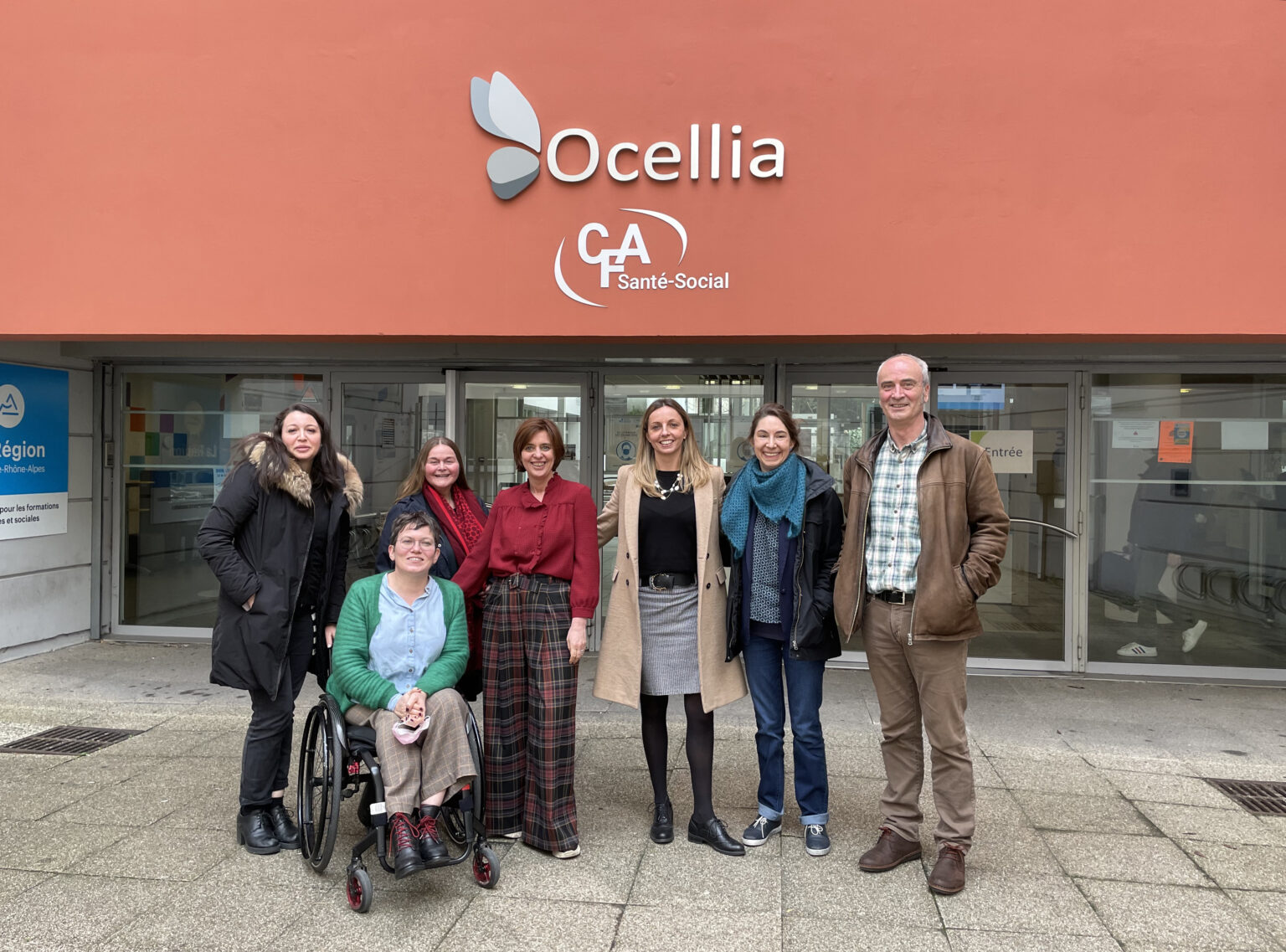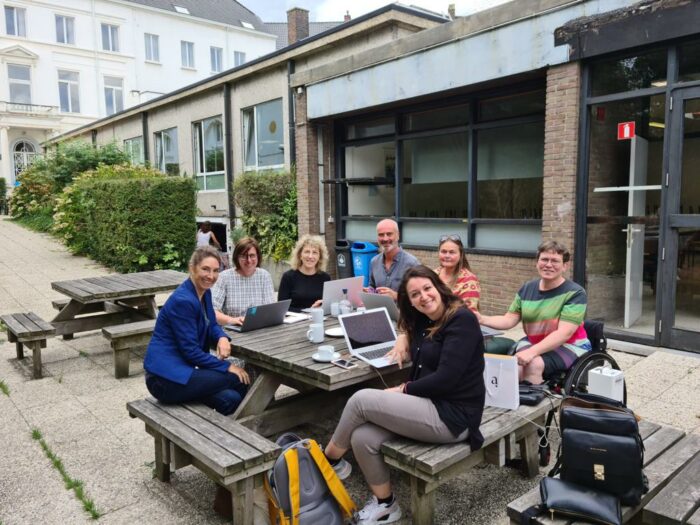In this section you will find a description of the Erasmus+ project: how it developed, with what objectives and through which actions. Here you will also find a lot of material made available by the partner Institutions about their activities and learning experiences. You will thus be able to get to know us better and dip into the work we have done together!
This website is dedicated to social work lecturers, both at under and post graduate level, in order to support service users’ involvement in social workers‘ education and professional training. More generaly, the content of this website (toolkit + documentation) is intended for social work educational institutions in european countries.

This project, starting from various existing experimentations, intends to develop a common pedagogical program to promote participation of service users in social work education. It will thus enhance mutual knowledge on social issues and policy within the E.U., with a focus on service users’ participation.
All partner institutions involved in this project educate/train future social workers in 4 different EU countries (France, Belgium, Italy and Sweden). They have already experimented programmes including service users’ participation. Thanks to these experiences, they have identified the benefits and some limits to these new developments. The most common being that :
– Up until recently, many such initiatives remain quite isolated, individually based and their sustainability is therefore not guaranteed.

– Most of these initiatives are currently based on service users’ testimonies, which remains quite a narrow approach to participation.
– Participation is often adressed as a one-way process, reflected in the idea that service users are generally invited to take part in the students’ educational programs and still very rarely the other way round. When students have the opportunity to take part in activities beyond the walls of their educational institutions, participation is still very rarely mentioned.
Although social workers’ education is also specific to each country, it is being harmonised as part of the Bologna process. Thus, educational institutions that train social workers within the EU are
facing common issues, particularly those related to service users’ participation within their training curriculum. By service users, we mean people who are using, who want to use, or who have used services or facilities in the social sector (for instance : people who live in residences, people with disabilities, migrant people, etc.…). The challenge is about taking into account their knowledge, based on their experience of social vulnerability and social services and include it in social workers’ training programmes.

More specificaly, this project aims at :
– Improving knowledge and visibility on the current experiments developed in the four partner countries (France, Belgium, Italy and Sweden) in order to spread them around other educational institutions;
– Extending and diversifying the pedagogical approaches related to service users’ participation in the education of future social workers, by enhancing teachers’ expertise and developing new learning tools ;
– The development of professional identity of (future) social worker is an important aspect in social work education ; It is a permanent educational process and will be enhanced by field experiences when students get in contact with service users.
Moreover, this project intends to promote a more inclusive training model for social workers within the European Union. « Social work is a practice-based profession and an academic discipline that promotes social change and development, social cohesion, and the empowerment and liberation of people » (definition of social work approved by the General Assembly of the IASSW in 2014). This
definition can also apply to future social workers, during their educational time. Indeed, future social workers’ education is based on an alternation of theory and practice and seems to be particularly prone to innovations facilitating social inclusion, and this for the following reasons :
– As a result of their close relationship with professionals of the field and research activity, training institutions for social work represent real laboratories to experiment innovative practices. These institutions already deal with the topic of service users’ participation at a European level.
– Innovative practices implemented in social workers’ education have large and long-term consequences on social issues. In effect, actions taken with various groups have a major impact in terms of their social inclusion, including those involving future students.
This project was run by four higher educational social work institutions (OCELLIA, Jönköping University, Artevelde University of Applied Sciences and Universitá Cattolica del Sacro Cuore)) from August 20 until June 2023. These four institutions adopted a collaborative and participative approach in its different phases and final intellectual productions. The projects’ implementation was organised along four major phases, including numerous and various kinds of participants :
from September 2020 to May 2021 :
« Mapping out on experiments of services users’ participation » by each partner institution, in order to establish :
• The legal framework on service users’ participation in each partner country ;
• Literature reviews on service users’ participation in social work education ;
• A synthetic presentation of pedagogical actions carried out in the respective institutions (survey and focus groups/interviews).
from June 2021 to March 2022 :
« Design of a service users’ participation toolkit », dedicated to sharing experiments and pedagogical tools amongst participants.
This production was based on 3 training sessions that took place in France, Belgium and Sweden involving researchers, lecturers, professional social workers and service users.
from March 2022 to February 2023 :
Develop, test and design of a training scheme « European week on participation »,
based on 3 field exploration mobilities for students and pedagogical staff from each partner country.
from February 2023 to June 2023 :
Development and dissemination of projects results based on the outcomes of step 1, 2 and 3, specificaly dedicated to the organisation of national and international workshops.
These different steps were jointly designed and managed throughout transnational meetings organised in each partner countries all along the 3 years’ duration of the project.
The results of this project are to be considered at several levels. This project aims at designing 3 intellectual outputs intended for social work teachers in order to support service users’ involvement in social work education :
1. Mapping out of experiences on services users’ participation that aims at producing information regarding service users participation in each partner countries with : national principles regarding service users’ participation, in order to adapt pedagogical approaches to local contexts / Literature review on service users’ participation in social work education (bibliography) / A synthetic presentation of pedagogical experiences carried out in each partner country / A video on one remarkable experience carried out in each partner institution.
2. Creation of a toolkit based on the different material produced along the project. Intended to be used either, in distance or face-to-face learning situations, this toolkit will eventually be shared on a larger European scale. It is about building up a pedagogical toolkit allowing teachers to facilitate the inclusion of service users in education.
3. Creation of a European week on participation with formalization of the tested exchanges. Redaction of a “European Week of participation label” distributed by national and European networks. This project, starting from various existing experiences, intends to develop a common pedagogical program at a European scale based on fieldwork exploration of participation. It will thus enhance mutual knowledge on social issues and policy within the E.U., with a focus on service users’ participation. It will be integrated to the education of future social workers and requires bilateral mobilities (face-to-face or digital) between educational institutions.
All results are presented in the project website.
Expert by experience
In this project, we use ‘service users’ and ‘experts by experience’ to highlight the experiential knowledge brought by people who faced life difficulties, using social services and/or experiencing relationships with professionals in welfare organizations.
Expert by experience refers to service users’ experiences as knowledge and that service users are seen as experts on this knowledge.

SOCIAL WORK EDUCATION
EXPERTS BY EXPERIENCE

